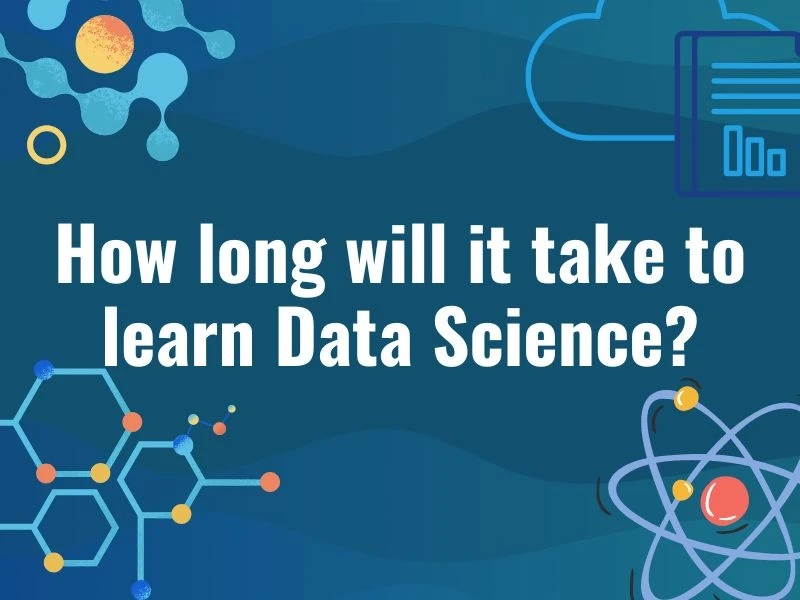Data science is an exciting and rapidly growing field with applications in almost every industry. But what exactly is it? To put it simply, data science encompasses a wide variety of disciplines and rigorous processes that employ skilled professionals to uncover insights from data. It involves leveraging tools and techniques to uncover valuable insights and draw meaningful conclusions from data.
So How long will It take you to learn Data Science? That depends on several factors, including your experience level and the specific area of focus within data science you wish to pursue.
Steps to Learn Data Science
First and foremost, it is important to understand the fundamentals of data science. Learn the basics by getting familiar with data analysis techniques and algorithms, machine learning, statistical modelling and other concepts associated with data science. Additionally, spend some time getting familiar with computer programming languages such as Python or R which are widely used in data analysis.
Second, develop a strong foundation in math and statistics so you can apply them to your data science projects. Topics like probability theory, linear algebra and calculus will come into play when you need to calculate or analyze something. Having a deep understanding of numbers will give you an edge in data science applications.
Thirdly, practice using datasets to gain practical experience in analyzing and manipulating them using tools like Excel or Google Sheets. This will help you learn the different types of data analysis tasks that you might encounter while working on projects related to data science such as cleaning datasets or conducting basic mathematical operations on them. Moreover, exploring technologies used for analyzing datasets like SQL or Hadoop can greatly benefit your understanding of how large datasets are handled by businesses or organizations that use them for internal operations or insights.
Fourthly, exploring machine learning algorithms and techniques is essential for a successful career in this field as most modern-day applications are based on machine learning models for improving accuracy or efficiency. Attend classes or do a course to keep yourself updated about the latest trends in this domain as it changes rapidly over time.
Developing Your Skill Set
The answer varies depending on a few factors namely, your prior knowledge and experience, the effort you make to learn, and the tools and resources you use for learning. To get started, begin by defining what “Data Science” means understanding the scope of data science helps form the basis of your study. After setting realistic goals and expectations, identify which learning style best suits you this could be self-study or attending workshops/tutorials to gain formal knowledge. Analyze both your strengths and weaknesses to determine what areas need more focus and attention.
It's also important to commit to a reasonable time frame for completing the task of learning data science this could be anywhere from 6 months or longer depending on how much time you can realistically dedicate per week (and remember to be realistic). Narrowing your focus of study areas is paramount as there are many different aspects needing focus when it comes to data science. Finally, committing yourself not only to continual education but also seeking out avenues for support during your studies is an important way to avoid feeling isolated or becoming overwhelmed by the abundance of information available about this topic.
Challenges You May Face Learning Data Science
The complexity of the subject matter increases with each level of advancement, so having a clear understanding of your knowledge gaps will help you focus your time and effort more efficiently. You must also learn how to work effectively with other Data Scientists, as collaboration within the field is essential for successful outcomes.
Additionally, consider the amount of time you need to commit to becoming proficient in Data Science. it usually takes several years to become an expert in the field. However, if you are already comfortable dealing with data and have experience working with coding languages such as Python or R, then the learning process may be shorter.
Time Estimates to Learn Data Science
The learning curve of mastering data science can be quite steep and varies based on your prior knowledge and skill level. If you are already familiar with computer programming, mathematics, and statistics, then you may only need a few months to become proficient in the basics of data science. However, those who are starting from scratch may require up to two or three years of diligent study and practice.
Analytics Jobs
It should also be noted that although it’s possible to learn the fundamentals and principles of data science relatively quickly, it takes much longer to become a master at it. Becoming a truly great data scientist requires continual practice and a commitment to keep growing as technology changes over time. Additionally, mastery means much more than just understanding the concepts and principles — it requires being able to apply them in real-world scenarios and solving challenging problems using your skillset.


